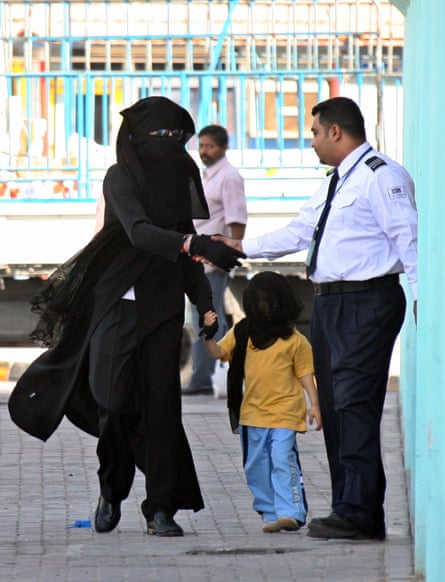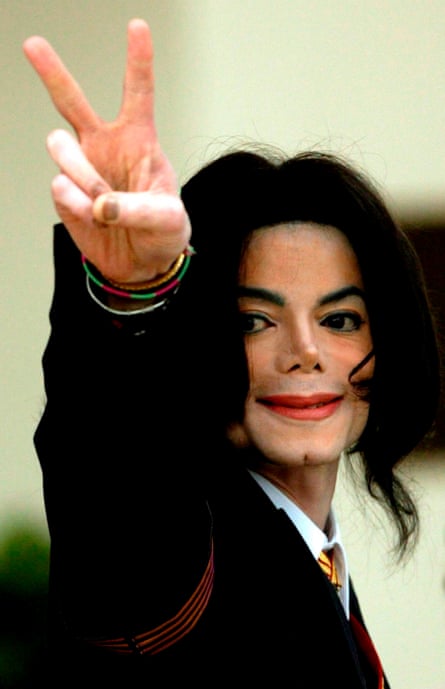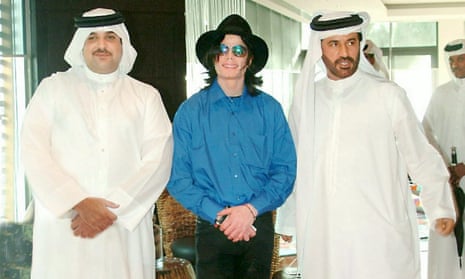Omar Shaheen remembers the moment well. In early 2005, the young Bahraini was driving when he received a surreal job offer: the chance to work with Michael Jackson. “It was totally out of left field,” he recalls. “It is a pinch-yourself kind of moment when you get a call to say you’re going to be working with someone who you idolise and is the biggest superstar of all time.”
The request came from Sheikh Abdulla bin Hamad al-Khalifa, the second son of the king of Bahrain, who asked Shaheen to set up a state-of-the art recording studio on his grounds in anticipation of the star’s arrival. “There are so many adjectives to use,” Shaheen says of what was to unfold. “It was bizarre. It was crazy.”
Both are accurate words to describe the time when the former most celebrated entertainer in the world resided in an archipelago off the Saudi Arabian coast. For nearly a year Jackson lived in Bahrain, struggling with his mental health and staving off bankruptcy while making plans for a comeback album and indeed recording some of it, though the demos – some of the most sought-after Jackson rarities – have yet to see the light of day.
Before his arrival, Jackson was defending himself in a California court against charges of intoxicating and molesting Gavin Arvizo, who was 13 years old at the time of the alleged abuse. News channels beamed daily footage of Jackson’s deteriorating health. In one lasting image, the then 46-year-old singer was rushed to the court in pyjama bottoms, clutching his bodyguards for support.

Abdulla, a big fan of Jackson’s who dabbled in songwriting, had recently been introduced by phone to the star through Jackson’s brother Jermaine, who was a regular in Bahrain since converting to Islam in 1989. “I wanted [Michael] to be free of debt’s burden,” Jermaine wrote in his memoir You Are Not Alone. “I put Michael on the phone to Prince Abdulla one morning on the ride to court. They spoke excitedly about plans for the future, exchanged numbers and, from then on, remained in regular contact.”
The prince wanted to help Michael recover, says Ahmed al-Khan, a financial adviser hired by the sheikh to work with the singer. “But of course, in order to get Michael, there was also baggage that came with him.” (Numerous attempts to reach Abdulla to comment for this article via his record label, former legal team and London’s Bahraini embassy were unsuccessful.)
Abdulla spoke to Jackson several times during the trial, floating the idea of him living in Bahrain and making music there once he was free to travel, and on 29 June 2005, just two weeks after his acquittal on all charges, a weary Jackson touched down at Bahrain International airport. According to news reports, he had flown in from Europe with Abdulla, who would celebrate his 30th birthday the following day.
In the ensuing 11 months, Jackson called Bahrain home, gradually emerging from his reclusive shell to mix with locals and shop in malls, badly disguised in a woman’s abaya. With a view to securing his finances, he also signed a contract that involved a collaborative album with the sheikh. But Jackson’s friendship with Abdulla would end the same way as so many of his personal relationships: with a lawsuit.
Had Jackson not reneged on his album deal with the sheikh, tragedy could have been averted, according to Guy Holmes, the English record executive who managed Jackson that year. “The plan that Abdulla put together with Michael and myself was a really healthy, long-term, good thing,” he says. “And I truly believe that he would be alive today if he had stuck with his word.”
While Jackson’s name was badly tarnished in the US, Bahrainis still knew him as the genius behind Thriller, and he was welcomed to the country. “I don’t know if many people were interested in his court case here,” says Arif Rahimi, a Bahraini businessman who gave Jackson an impromptu tour of his in-laws’ house before the singer enquired about buying it. The attitude towards him “wasn’t negative at all”, Rahimi adds.
Shortly after arrival, Jackson – then “a broken man”, says al-Khan – was joined by his three children and their nanny. They were provided with a luxury villa near the sheikh’s quarters as well as a chauffeured Rolls-Royce and security detail. In the months following, the King of Pop and the sheikh reportedly became fast friends, listening to music together and coming up with song ideas. Abdulla said it was as if the two had already spent time together, while Jackson described his host as “the very best, amazing, so kind” to the Associated Press.
Jackson had not released a studio album since 2001’s disappointing Invincible, and was out of contract after a spat with Sony. “‘How do we get him back? How can I make people enjoy what this guy gave the world?’ That was his thing,” al-Khan says of Abdulla’s hopes for Jackson. “He wanted to be part of rewriting history.”
When Hurricane Katrina devastated New Orleans in August 2005, wheels were put in motion. A few days after the storm dissipated, Jackson’s publicist announced that he had written a song to benefit its victims. Abdulla’s incentive was never money, stresses al-Khan, so a charity record was a fitting way to launch their joint effort. “He thought it was a more humane approach towards taking care of him,” he says.
Abdulla enthused to the press about Jackson’s attitude. “I looked at him and he looked at me, and we knew exactly what we needed to do. Michael is such a humanitarian,” he told GQ at the time. “It’s not an easy road, but it will happen. The song is going to come out no matter what.”

John Barnes and Bill Bottrell, producers, songwriters and instrumentalists who had worked on Jackson’s Bad and Dangerous albums, were brought to Bahrain at Abdulla’s expense. Barnes arrived first, while Jackson spoke enthusiastically to Bottrell over the phone about the planned album.
“‘Billy, we’re gonna make the best music ever! When the time is right, Billy, we are going to make Mozart music!’” Bottrell recalls Jackson telling him, adding: “He said ‘when the time is right’, like four times.”
The timing, it turned out, was not right. Although Jackson’s preferred vintage microphones were ordered at a cost of $100,000, he was in no mood to record. Holmes, an Island Records veteran whose label Gut Records had released hits by everyone from Tom Jones to Right Said Fred and Crazy Frog, was flown in to meet with Jackson as a precursor to heading the the pop star and the sheikh’s joint venture record company. The initial meeting didn’t go well.
“Michael was sitting behind a cloth curtain,” Holmes recalls. “You couldn’t really see him. And so I walked out of the meeting and said, ‘Tell him to fuck off. This is what I do for a living, not pissing about.’” It later became apparent why Jackson was hiding. “He basically was skin and bones after the court case, and I think that’s what it was. He was ashamed of the way he looked.”
Months later, Holmes was persuaded to return to Bahrain. He signed on as CEO of new company 2 Seas Records (the Arabic word “bahrain” means “two seas”), and also agreed to become Jackson’s personal manager. Opening Jackson’s books, the record executive was aghast to discover the star was “right on the verge of going bankrupt”, and involved in no fewer than 47 lawsuits. “I counted them because I had to deal with them,” says Holmes. “It was a real avalanche of shit, because suddenly I became the point person and no one bothered to tell me.”
Jackson’s financial problems stemmed from a staggering $272.5m personal loan that was reportedly costing him $4.5m in monthly interest, along with an uncontrollable spending habit. The loan was secured against Jackson’s share of the valuable Sony/ATV Music Publishing catalogue, which Sony feared could get into the wrong hands if Jackson defaulted on his payments, according to a 2006 report in the New York Times.
Jackson’s Bahraini advisers, including al-Khan, worked alongside Sony Music to refinance the debt held by Fortress Investment Group on better terms. “We were walking on eggshells,” says al-Khan. “If things had gone south and he had lost [his rights to the music catalogue], what is my accountability? Will Michael’s family come after us? You get scared.”
One of Jackson’s legal battles required him to visit London twice to give depositions, first in October 2005, when he was accompanied by his children and Abdulla. During that stay, Jackson made several visits to Metropolis Studios in Chiswick to record his part in the Hurricane Katrina single, I Have This Dream, co-written by Abdulla. Al-Khan attended the sessions, which featured a hired orchestra. “It was beautiful,” he says. “There was a full-fledged team. Michael kept on changing stuff, so it wasn’t done at the snap of a finger.”
A Los Angeles studio was also rented, where James Ingram, Ciara, Snoop Dogg and gospel singer Shirley Caesar recorded their vocals for the song, according to the Associated Press. Missing, however, was Jackson’s final vocal track. During the lawsuit that eventually ensued, Abdulla claimed that he and Jackson agreed that the pop star’s singing was not up to standard, and an extra recording session was booked which Jackson did not turn up for. Abdulla also claimed to have spent $2.2m on I Have This Dream, which was never completed.
Efforts to get Jackson back into the studio in Bahrain fared little better. Although Holmes says he heard Jackson singing twice at 2 Seas – “All the hairs on the back of your neck stand up. He had a gift from God, and he had it big time” – getting him to show up was a chore. This is because Jackson was probably suffering from depression at the time, several sources in Bahrain observed. He was also self-medicating, says Holmes. “He was on all sorts of things: up, down, sideways and all sorts. Anyone with half a brain could see Michael wasn’t well.”
In an attempt to get Jackson’s mojo back, Holmes hired celebrated “mind mapper” Tony Buzan, who made nine trips to Bahrain at a cost of $343,000, according to court documents. Though the motivational guru, who died in 2019, described Jackson as an eager student, the sessions proved futile.
Holmes says he did his best to keep Jackson’s finances in check, selling artwork that was lying in storage against Jackson’s wishes and putting together a deal with 2 Seas that would raise millions with minimal effort. They included plans for an album, a memoir, a stage musical and a Cirque du Soleil show. “On one book publishing deal alone, the first offer I got was $24m,” he says. Jackson signed the contract, and in April 2006 a press release announced a forthcoming album with the Bahrain-based label. Earlier that week, Jackson’s advisory team in Bahrain announced they had refinanced his debt, giving the singer a cash infusion of about $30m and a financial lifeline.
With money in his pocket, Jackson’s demeanour noticeably perked up, says al-Khan. “When his [financial] burden was relieved, he probably felt like a free bird. He had the confidence, his pride was back,” he says. “But he left the shelter of Sheikh Abdulla who put him back on his feet, and was thrown in the wild again.”
As he questioned his future in Bahrain, Jackson began fielding offers to get back on stage, according to Holmes, who says he received word from industry insiders. “I knew what he was doing, which was incredibly stupid. [Promoters] were talking about doing a whole bunch of shows and giving him a big wedge of money. It got back to me extremely quickly,” he says. “Physically he was fucked … he was totally incapable of doing a two-hour live show.”
By the time Bottrell and drummer Brian MacLeod arrived in Bahrain to record songs for the album in June 2006, Jackson had left the country. Though he had been expected back after giving his second deposition in London and appearing at an MTV event in Tokyo, he had moved on. “One day Abdulla walked into the studio and said, ‘I don’t think he’s coming’,” recalls Bottrell. Less than three months after going public with his 2 Seas deal, Jackson announced he was severing ties with Holmes and the rest of his Bahrain team. “We wanted to make history. It would have been great for Bahrain, but it didn’t happen,” says Shaheen, whose studio project had lost its marquee name. “The dream kind of ended there.”

In November 2008, Abdulla sued Jackson in London’s high court, saying he had spent $7m on the star in the form of loans and expenses. Jackson claimed they were gifts and that he signed the contract under duress.
Along with I Have This Dream – which Bottrell says sounded “grand” – two other Jackson-Abdulla co-writes were mentioned in the case: Light the Way and He Who Makes the Sky Gray. Although Sony continues to convert Jackson demos into singles, to some controversy, none of the Bahrain recordings are likely to be released, says Holmes, because of Abdulla’s respect for the hitmaker’s legacy: “I don’t think you’ll ever prise them out of him.”
The day before Jackson was due to testify, the parties settled out of court. Fortune magazine reported that Abdulla received $5m from promoters AEG Live to break Jackson’s contract with 2 Seas. The deal allowed AEG to schedule Jackson’s ill-fated 50-show residency at London’s O2 arena, entitled This Is It. Seven months later, Holmes was in his house in Los Angeles when he got word that the King of Pop had died hours after leaving rehearsal. “I just sat on the sofa for about half an hour going, ‘Bollocks. What a bloody waste.’”
